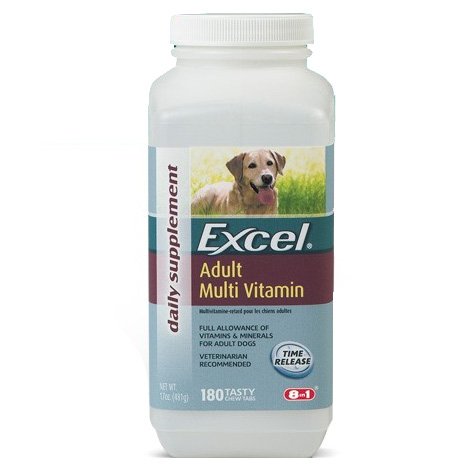Older dogs have special health needs and may require more attention and care than younger dogs. Common health problems associated with older dogs include: arthritis, circulatory problems, ear infections, hearing problems, sight and smell disorders, dental problems, incontinence, weight problems, and kidney disease.
But there is much you can do to prevent or delay these problems and ensure happy twilight years! Pictured to the right is Excel Adult Multi Vitamin Dog Daily Supplement.
When dogs move into their senior years, they go through physical transformations causing them to slow down. Maintaining a health routine will help senior dogs live a fulfilling and content life.
How old is senior?
This depends on the breed and on the individual pet. Larger breeds tend to age more rapidly than smaller breeds. In general, toy and small breed dogs (up to 25lbs) become senior at about 10 years of age, while medium and large breed dogs (26 – 100lbs) can be considered seniors by the age of 8. Giant breeds (110lbs +) having shorter life spans become seniors as early as 5 years of age.
Senior dogs have special dietary needs for a variety of reasons. First, older dogs slow down. Like humans, they tend towards being more sedentary as they get older. Therefore, they need fewer calories. Also as the organs age, digestion and absorption are not as strong. Varied diet and a high quality dog food will go a long way to protecting your dog’s coat, energy levels, and proper digestion and elimination. Vitamin and mineral needs of elderly dogs often change. As their digestive systems weaken, they may not extract the full value of the foods they eat.
Some of those special nutritional needs of senior dogs can be supplied in the form of dog vitamin supplements. Talk with your veterinarian to determine if supplementation would benefit your dog.
